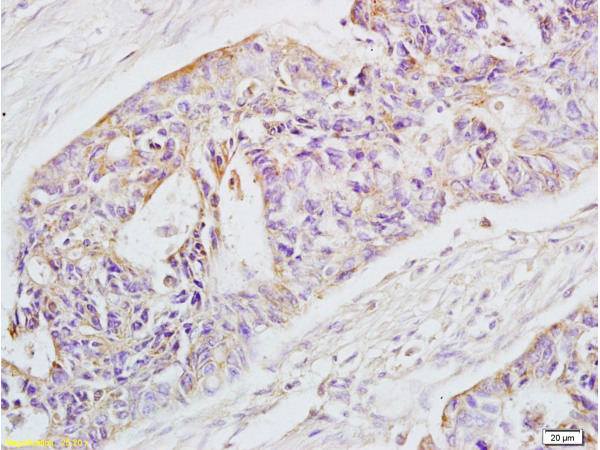Anti-EPCAM [B38.1]
Ab01197-1.1
ApplicationsELISA, RadioImmunoAssay
Product group Antibodies
ReactivityHuman
TargetEPCAM
Overview
- SupplierAbsolute Antibody
- Product NameAnti-EPCAM [B38.1]
- Delivery Days Customer7
- Application Supplier NoteHas been used to generate a human engineered monoclonal antibody (Ammons et al, 2003). B38.1 has been shown to be able to mediate antibody-dependent cytotoxicity (Robinson et al, 1991). It has undergone clinical trials as an anti-carcinoma drug (de Bono et al, 2002 and Better et al, 2002). It has also been used in ELISAs to test the reactivity of its humanised construct, ING-1, that it has an affinity in the nM range by competition assays, and it has been shown to be active in vivo (Ammons et al, 2003).
- ApplicationsELISA, RadioImmunoAssay
- Applications SupplierRIA; ELISA
- CertificationResearch Use Only
- ClonalityMonoclonal
- Clone IDB38.1
- Gene ID4072
- Target nameEPCAM
- Target descriptionepithelial cell adhesion molecule
- Target synonymsBer-Ep4, BerEp4, DIAR5, EGP-2, EGP314, EGP40, ESA, HNPCC8, KS1/4, KSA, LYNCH8, M4S1, MIC18, MK-1, MOC-31, TACSTD1, TROP1, epithelial cell adhesion molecule, adenocarcinoma-associated antigen, cell surface glycoprotein Trop-1, epithelial glycoprotein 314, human epithelial glycoprotein-2, major gastrointestinal tumor-associated protein GA733-2, membrane component, chromosome 4, surface marker (35kD glycoprotein), trophoblast cell surface antigen 1, tumor-associated calcium signal transducer 1
- HostMouse
- IsotypeIgG1
- Protein IDP16422
- Protein NameEpithelial cell adhesion molecule
- ReactivityHuman
- Reactivity SupplierHuman
- Reactivity Supplier NoteMice were immunized with membrane-enriched fractions of human metastic mammary carcinoma cells. The spleens were extracted and fused with NS-1 to generate primary hybridoma cultures. These were screened using solid phase RIA for those which were reactive with metastic mammary tumor cells from livers but were not reactive with healthy livers.
- Storage Instruction-20°C,2°C to 8°C
- UNSPSC41116161






